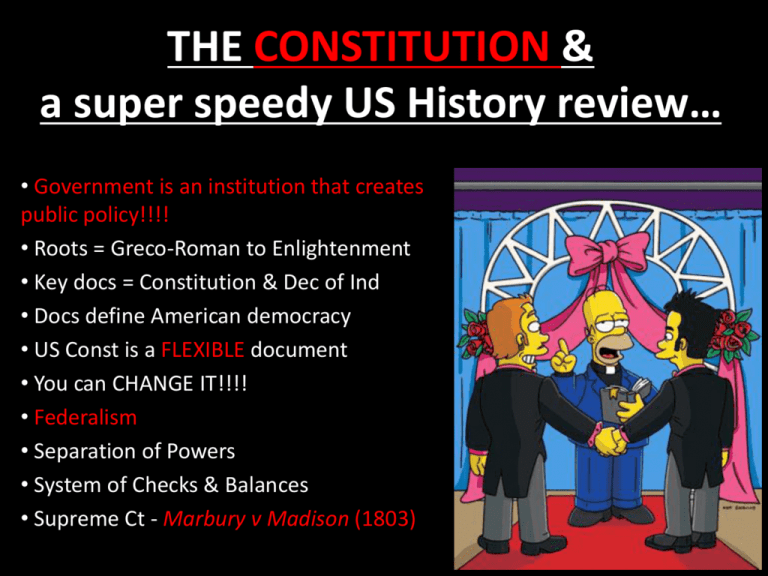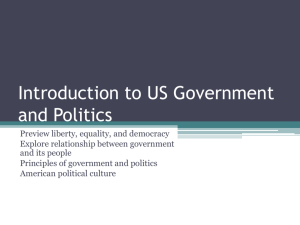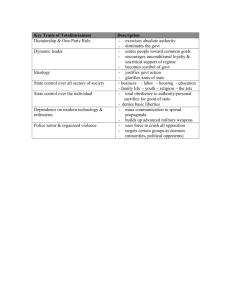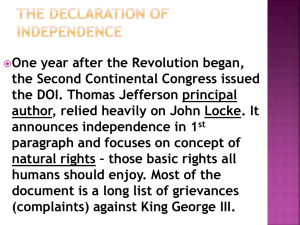THE CONSTITUTION & super speedy US History
advertisement

THE CONSTITUTION & a super speedy US History review… • Government is an institution that creates public policy!!!! • Roots = Greco-Roman to Enlightenment • Key docs = Constitution & Dec of Ind • Docs define American democracy • US Const is a FLEXIBLE document • You can CHANGE IT!!!! • Federalism • Separation of Powers • System of Checks & Balances • Supreme Ct - Marbury v Madison (1803) Government Public policy Democracy Direct democracy Representative democracy Traditional democratic theory Pluralist theory Elite theory Bureaucratic theory Hyperpluralism Social contract Natural rights Declaration of Independence Articles of Confederation Federal system Connecticut (great) compromise Three-fifths compromise Commerce & slave trade compromise ratification VOCAB words Federalists Anti-Federalists Federalist Papers Constitution Limited government Popular sovereignty Separation of powers Checks and balances Federalism Amendments Bill of Rights Judicial review Marbury v Madison Virginia Plan What is Government? HAROLD LASWELL…. “who gets what, when, and how” Govt = formal and informal institutions, people, & processes used to create and conduct public policy Public Policy = exercise of govt power to maintain legitimate authority & control over society Preamble = goals of public policy • • • • • • *This is essentially the purpose of US government… Union / sovereignty Justice Rule of law National defense Econ health Individual freedoms The late… Forms of Govt • Anarchy = lack • Autocracy = absolute monarchy, constitutional monarchy, dictatorship • Oligarchy = aristocracy, theocracy • Democracy = direct & REPRESENTATIVE Theories of dem govt • • • • • Traditional democratic theory = consent of the governed Pluralist theory = Dahl & IGs Elite theory = upper class & self-interest Bureaucratic theory = Weber & hold power w/ public policy Hyperpluralism = gridlock & ineffectiveness 2 MOST IMPORTANT EARLY TRADITIONS • LIMITED GOVERNMENT • REPRESENTATIVE GOVERNMENT Influences • • • • • Greeks & Romans Magna Carta 1215 Parliament Petition of Rights 1628 English Bill of Rights 1689 • Enlightenment Philosophy = social contracts & natural rights • Eventually = Dec of Ind 2 IMPORTANT PHILOSOPHERS • JOHN LOCKE (social contract & natural rights, LL&P) • MONTESQUIEU (Branches of Govt) • Tricks…. Colonial Stuff • • • • • • • • • • Colonial Charters House of Burgesses 1619 Mayflower Compact 1620 Yuck…the British Continental Congress 1774 Second Cont Congress 1775 Continental Army Declaration of Ind Articles of Confederation Dec of Ind: social contract & natural rights / list of grievances / colonial unity • ART OF CONFED = • “league of friendship” • a weak central govt, no exec/judicial • Had limited power over the states •Unicameral Congress (ec state = 1 vote) that could NOT tax or regulate trade • 9 of 13 states for legislation • Unanimous 13 votes to amend • Led to Shay’s Rebellion Weaknesses of the Articles of Confederation… How the Constitution fixed those weaknesses… “league of friendship” between the states Created a federal system between the national and state level Congress could NOT tax; it could only request contributions from the states Nat’l govt given the power to tax (HOUSE OF REPRESENTATIVES!!!) Congress could NOT regulate interstate trade or foreign commerce Congress was given the power to regulate commerce b/t states and foreign No separate executive to enforce the acts of Congress Article II created an executive office to enforce the laws of Congress (bureaucracy) No national judiciary to handle state disputes Article III created a nat’l judiciary w/ a Supreme Court and lower courts States and the nat’l govt had the authority to coin money ONLY the nat’l govt has the authority to coin money Each state had ONE vote, regardless of size or population Population in the House, equality in the Senate 9/13 states required to pass legislation Bills need a simple majority in both houses of Congress Unanimous consent to amend 2/3 of Congress and ¾ of the states are necessary to amend Problems/Fights • • • • • • • • • Great Compromise (CT) Federal system VA/NJ Plan? 3/5 Compromise Commerce & Slave trade Ratification Federalists / Anti-Feds Federalist Papers (85) Bill of Rights







